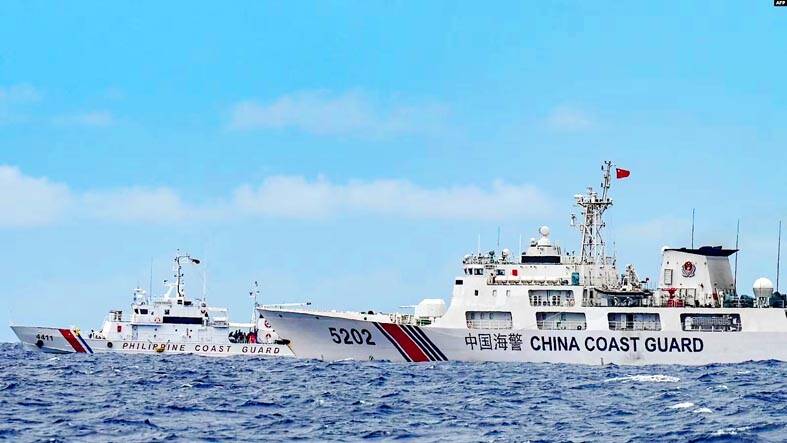The Ministry of Foreign Affairs (MOFA) yesterday hinted that Taiwan might join forces with the Philippines to protect navigational freedoms, days after Beijing blocked Philippine supply ships in the South China Sea.
The ministry made the comment when asked whether Taipei would be willing to join forces with the Philippines to protect the latter from increasingly aggressive activities by the Chinese People’s Liberation Army Navy and China Coast Guard.
Taiwan “is willing to cooperate with any other nation with shared values in areas of common concern, including maintaining peace, stability and prosperity in the Indo-Pacfic region,” it wrote in a statement.

Photo: AFP
A Chinese reconnaissance aircraft intruded into Japanese airspace on Monday, a day before China’s military and coast guard vessels blocked Philippine supply ships from carrying out replenishment operations at Sabina Shoal (Xianbin, 仙濱暗沙), which Taiwan also claims.
MOFA said China’s frequent use of illegal, coercive and unpeaceful measures against other nations’ ships and its incursion into Japanese airspace had increased regional tensions.
Beijing has been mounting an increasing number of incursions into Taiwanese and Japanese air defense identification and exclusive economic zones in an escalation of regional tensions, it said, adding that China and Russia have conducted provocative naval drills.
Beijing has deployed more than 100 ships to disrupt Philippine replenishment missions and used the rights of protection as “pretext for ... illegal, threatening, coercive and other nonpeaceful means to interfere with the navigation of other countries’ vessels,” MOFA said.
Taiwan calls on all parties to resolve disputes peacefully by following international law, it said.
Beijing “poses a significant threat to the security of Taiwan and the Indo-Pacific region,” it said.
“China’s behavior — which MOFA strongly condemns — has compromised regional peace and stability,” it said, adding that Taiwan “urges like-minded nations to jointly counter China’s authoritarian expansion.”
The global community has increasingly recognized that freedom of navigation and overflight is crucial to peace and security in the Indo-Pacific region, it said, citing statements from the G7 earlier this year.
“Taiwan calls on all involved parties to exercise restraint and follow the UN Convention on the Laws of the Sea,” MOFA said.
“As a responsible member of the international community, Taiwan will continue to cooperate with the US, Japan and other like-minded nations to defend a free and open Indo-Pacific region,” it added.

DAREDEVIL: Honnold said it had always been a dream of his to climb Taipei 101, while a Netflix producer said the skyscraper was ‘a real icon of this country’ US climber Alex Honnold yesterday took on Taiwan’s tallest building, becoming the first person to scale Taipei 101 without a rope, harness or safety net. Hundreds of spectators gathered at the base of the 101-story skyscraper to watch Honnold, 40, embark on his daredevil feat, which was also broadcast live on Netflix. Dressed in a red T-shirt and yellow custom-made climbing shoes, Honnold swiftly moved up the southeast face of the glass and steel building. At one point, he stepped onto a platform midway up to wave down at fans and onlookers who were taking photos. People watching from inside

A Vietnamese migrant worker yesterday won NT$12 million (US$379,627) on a Lunar New Year scratch card in Kaohsiung as part of Taiwan Lottery Co’s (台灣彩券) “NT$12 Million Grand Fortune” (1200萬大吉利) game. The man was the first top-prize winner of the new game launched on Jan. 6 to mark the Lunar New Year. Three Vietnamese migrant workers visited a Taiwan Lottery shop on Xinyue Street in Kaohsiung’s Gangshan District (崗山), a store representative said. The player bought multiple tickets and, after winning nothing, held the final lottery ticket in one hand and rubbed the store’s statue of the Maitreya Buddha’s belly with the other,

‘NATO-PLUS’: ‘Our strategic partners in the Indo-Pacific are facing increasing aggression by the Chinese Communist Party,’ US Representative Rob Wittman said The US House of Representatives on Monday released its version of the Consolidated Appropriations Act, which includes US$1.15 billion to support security cooperation with Taiwan. The omnibus act, covering US$1.2 trillion of spending, allocates US$1 billion for the Taiwan Security Cooperation Initiative, as well as US$150 million for the replacement of defense articles and reimbursement of defense services provided to Taiwan. The fund allocations were based on the US National Defense Authorization Act for fiscal 2026 that was passed by the US Congress last month and authorized up to US$1 billion to the US Defense Security Cooperation Agency in support of the

HIGH-TECH DEAL: Chipmakers that expand in the US would be able to import up to 2.5 times their new capacity with no extra tariffs during an approved construction period Taiwan aims to build a “democratic” high-tech supply chain with the US and form a strategic artificial intelligence (AI) partnership under the new tariffs deal it sealed with Washington last week, Taipei’s top negotiator in the talks said yesterday. US President Donald Trump has pushed Taiwan, a major producer of semiconductors which runs a large trade surplus with the US, to invest more in the US, specifically in chips that power AI. Under the terms of the long-negotiated deal, chipmakers such as Taiwan Semiconductor Manufacturing Co (TSMC, 台積電) that expand US production would incur a lower tariff on semiconductors or related manufacturing